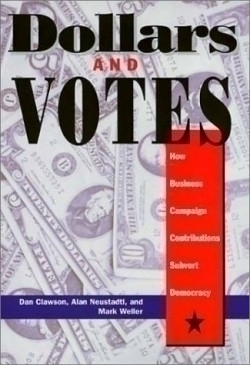Dollars and Votes
This sharply critical and well-researched diatribe on the evils of Political Action Committees (PACS) leaves readers with a clearly defined battle line between business and government.
Among other sources, the authors relied on interviews with PAC leaders who were surprisingly candid in describing how donations give them “access” to politicians.
They then document how this “access” becomes legislation crippled by a cancerous array of PAC-sponsored loopholes that provide specific benefits for specific businesses. This isn’t bribery, the authors say, but rather an accepted political process that has become as reform-resistant as juvenile delinquency.
For the political junkie, there are no surprises. Indeed, this scholarly work offers no significant insights into potential changes, but it provides a solid foundation for further investigation.
This stuff is not beach reading. The political charade the authors describe is so well orchestrated that even the participants see it as a kind of Monopoly-For-Real. One campaign contributor described a scene where a politician to whom he had given money turned around and organized a protest against his project. “That’s what he has to do to get elected. You can’t take that personally,” he said.
The authors cite a few examples of loopholes that result in specific benefits, but the book could use more specifics. However, the authors point out that the legislation itself is painstakingly written to obscure its real intention from voters.
“If voters were the key to public policy, the campaign finance system would long since have been changed,” the authors say. The authors - all sociologists - point out that the system fosters a sociological impetus on the political process. The giving of money is the germination of an anticipated dividend that the politician can’t help but take an interest in. It is the lifeblood of an extraordinarily expensive election process. The system offers no other means of election.
This is not a book for the political optimist. In fact, the only way to change the system would be to form your own PAC and by then you’d be too rich to want reform anyway.
Reviewed by
Joe Mielke
Disclosure: This article is not an endorsement, but a review. The publisher of this book provided free copies of the book to have their book reviewed by a professional reviewer. No fee was paid by the publisher for this review. Foreword Reviews only recommends books that we love. Foreword Magazine, Inc. is disclosing this in accordance with the Federal Trade Commission’s 16 CFR, Part 255.

